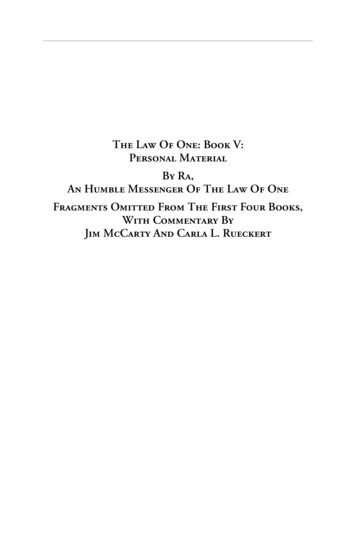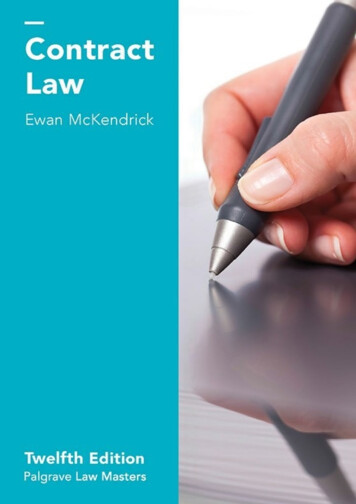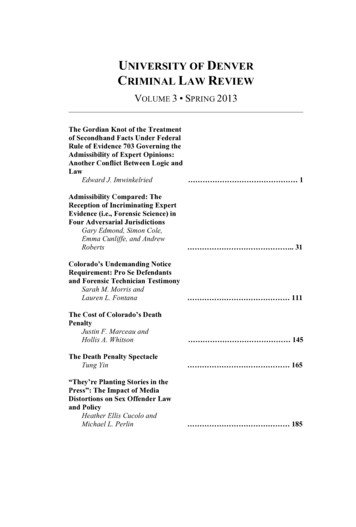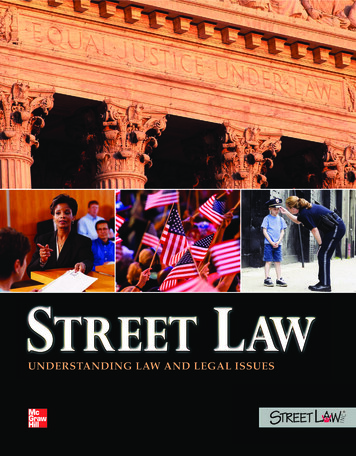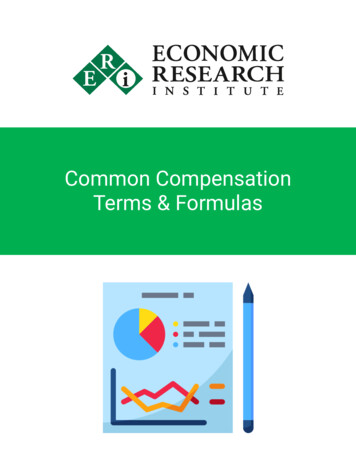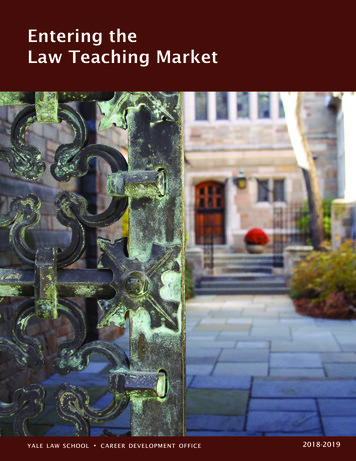
Transcription
Entering theLaw Teaching MarketYALE LAW SCHOOL CAREER DEVELOPMENT OFFICE2018-2019
Table of ContentsChapter 1Chapter 2Chapter 3Chapter 4The Lay of the LandA. IntroductionB. The Downturn in Law FacultyHiringC. Types of Academic PositionsD. Clinical TeachingE. The MarketF. SalaryQualifications for the JobA. Clerkships and Law SchoolCredentialsB. PublicationsC. Teaching ExperienceD. RecommendationsE. Additional Degrees in Related FieldsF. Work ExperienceApplying for PositionsA. The CVB. The Scholarly AgendaC. Direct ApplicationD. The AALS Faculty RecruitmentConferenceE. The Callback InterviewF. The OfferResourcesSome sections of this public guide have been removed due to proprietary natureF. Books and Other Written ResourcesG. Online ResourcesChapter 5AppendicesAlumni PerspectivesA. Some sections of this public guide have been removed due to proprietary natureB. Clinical TeachingC. Non-Clinical TeachingA. Sample CVsB. Academic FellowshipsC. Some sections of this public guide have been removed due to proprietary natureD. Sample Cover Letters, Parlay Letter, and Scholarly AgendasE. Some sections of this public guide have been removed due to proprietary natureF. FAR FormYale Law School Career Development Office
Index of Alumni NarrativesA. Perspectives on the Meat Market (anonymousauthors)B. Clinical TeachingProfessor Robert D. Dinerstein, J.D. ’77Associate Dean for Experiential Education, Director of the Clinical Program, Director ofthe Disability Rights Law Clinic, and Professor of Law American University –Washington College of LawProfessor Kristin Henning, J.D. ’95Professor of Law and the Co-Director of the Juvenile Justice ClinicGeorgetown University Law CenterC. Non-Clinical TeachingProfessor Mark C. Alexander, J.D. ’92Currently Arthur J. Kania Dean and Professor of LawVillanova UniversityFormerly Associate Dean for Academic Success and Professor of LawSeton Hall Law SchoolProfessor Hiram E. Chodosh, J.D. ’90Currently President, Claremont McKenna CollegeFormerly Dean, University of Utah, S.J. Quinney College of LawAssociate Dean for Academic Affairs and Joseph C. Hostetler—Baker & HostetlerProfessor of Law, Case School of Law, Case Western Reserve UniversityProfessor David M. Driesen, J.D. ’89University ProfessorSyracuse University College of LawProfessor David L. Gregory, LL.M. ’82; J.S.D. ’87The Dorothy Day Professor of LawSt. John’s University School of LawProfessor Tanya Hernandez, J.D. ’90Professor of Law and Associate Director & Head of Global and Comparative Law Programsand Initiatives Fordham University School of Law, Center on Race, Law and JusticeProfessor Henry E. Smith, J.D. ’96Fessenden Professor of LawDirector, Project on the Foundations of Private LawHarvard Law SchoolYale Law School Career Development Office
CHAPTER 1THE LAY OF THE LANDA. IntroductionThe work of a law professor combines research, writing, and teaching, infused with a strong dose ofautonomy. For those in clinical teaching it adds the rewards of direct client services. This combinationcreates a highly appealing mix for many people, including many YLS graduates. In fact, YLS graduatesrepresent a meaningful percentage of all law faculty. This means that YLS alumni are law professors inevery conceivable subject at institutions in every area of the globe. In our surveys of our alumni, lawprofessors consistently report a high degree of satisfaction in their work. Yet law teaching is not foreveryone. In this guide we will try to help you evaluate whether this world fits you, explain the lawteaching market, and provide some concrete advice on how to enter it.B. The Downturn in Law Faculty HiringRecent years have seen a marked downturn in the number of people taking the LSAT, the number ofpeople applying for admission to law school, and, most importantly, the number of people entering lawschool. At the moment, the extent to which this contraction is a cyclical shock, rather than a structural andpermanent one, remains unclear. (This year there was a significant uptick in the number of students takingthe LSAT and applying to law school.) Nevertheless, in response to declining applicant numbers, somelaw schools have downsized their enrollment and their faculty hiring. What is clear is that law schoolshave made substantially fewer tenure-track hires over the past three years. While many Yale graduatescontinue to secure very attractive academic jobs, some require more than one year on the market to do so,while others have been unable to secure a position. There continues to be uncertainty about the amount ofmarket-wide hiring that will take place in the coming years, as well as the focus of that hiring. Thecontinuing instability in the market also suggests that candidates would be well-advised to undertakeconsiderable due diligence before accepting offers from schools that may be in precarious financialconditions.C. Types of Academic PositionsMost applicants in the teaching market are aiming for tenure-track positions in classrooms or clinics,where they hope to progress from assistant professor to associate professor and, finally, to full professor.However, there are different types of teaching positions in law schools that vary in permanence, salary,voting status, and other issues. In addition to tenure-track teaching, three common types of positions thatmay be available to an entering law teacher are visitors, adjuncts, and legal research and writinginstructors.1. VisitorsTraditionally, a visiting professor is a tenured or tenure-track professor from one institution who is hiredto spend a semester or a year at another law school. The post may be used to fill a temporary need, covera sabbatical, or explore whether this visitor may make a good permanent hire (popularly known as a“look-see” visit). Recently an increasing number of schools have created “visiting assistant professor”(VAP) programs for those not currently on a law faculty. See below for more information on VAPpositions.Yale Law School Career Development Office
2. AdjunctsLaw schools hire adjunct professors to teach specific courses for a semester, with no promise of future orfull-time employment. An adjunct teaching position can be valuable to help you determine whether or notyou actually enjoy getting up in front of students and teaching. Adjunct work also may provide access to agood academic law library and contacts in legal academia who could assist in your publication efforts andserve as mentors and recommenders.If you are assessing whether being an adjunct teacher will help you in your goal to obtain a tenure-trackprofessor position, keep in mind that law schools are very focused on scholarship and publications. If theadjunct work allows you to focus on publishing, gain faculty input into your writing, and develop a cadreof supporters in academia, it will serve you well. If it instead prevents you from publishing due to thetime spent in classroom preparation, or provides very little opportunity to become involved in facultyacademic life, you should weigh these factors heavily. New teachers often spend five or more hours forevery “contact” hour teaching – and so teaching a course for the first time often interferes with producingscholarship.An additional potential disadvantage of adjunct teaching is that these positions are highly remunerated.Normally, adjuncts receive only a few thousand dollars per course, without other benefits of employment.3. Legal Research and Writing InstructorsMost law schools employ legal research and writing instructors. These individuals typically teach firstyear classes on research and writing, and may have additional duties in this area. According to a recentsurvey conducted by the Legal Writing Institute, 45% of legal writing programs in U.S. law schools havefull-time non-tenure-track teachers, 36% use a hybrid staffing model, 5% use adjuncts, and 6% havetenured or tenure-track teachers hired specifically to teach legal writing. 1 The use of term employmentcontracts is quite common. Salaries are reported as averaging 119,601 for legal writing programdirectors, with significant regional and school variance. Legal research and writing instructor salaries,excluding directors, are considerably lower, averaging about 83,188. 2Often candidates who are primarily interested in academic teaching wonder whether a legal research andwriting position will be a helpful entrée into the field. Many of the cautions stated in the above adjunctsection continue to apply. There are benefits to such positions: you gain a valuable skill in reviewingstudent writing; you demonstrate your interest in academia; you may gain access to great library andonline resources; and you might have a chance to develop relationships with faculty mentors. There areconcerns to weigh as well. Appointments committees seek candidates who want to be academicprofessors; research and writing instruction is quite different. In addition, you may be so busy with yournew, demanding job that you have no time for your own research and writing. Finally, legal research andwriting instructors may not be well-integrated into the faculty, thus impeding your ability to developfaculty mentors. Carefully evaluate the specific situation and your personal goals to see whether this typeof position is for you.1The Legal Writing Institute website has the survey results for the last few years, as well as other helpful information for potential legal researchand writing instructors such as a syllabus bank and job postings. The staffing model summary and table can be found at page 5 of the 2015Survey.2See p. xvi of the 2015 survey.Yale Law School Career Development Office
4. Academic Fellowships and Yale Law School’s PhD in Law ProgramAcademic fellowships provide an opportunity to spend one or two years at a law school in an academicposition for those interested in a career in law teaching. These positions were almost unheard of ten orfifteen years ago, but they are proliferating. They can be roughly placed in five categories.Research and Writing OnlySome fellowships provide a pure research and writing experience for individuals interested in preparingfor entry into the law teaching market. Some schools offer an informal, unpaid version of this researchopportunity, often called a “visiting scholar” or “visiting researcher.” The relationship may have a formalpath, but it is not uncommon to see these visits arranged more informally. Visiting scholars are usuallyprovided with library privileges, have access to workshops and academic events at a law school, and cansit in on classes with a professor’s permission. In some cases, a visiting scholar must pay a fee(considerably less than normal tuition), and typically prospective visiting scholar candidates must submitresearch proposals to individual professors or to committees. No financial support is provided.Teaching/VAP FellowshipsAn increasing number of schools are offering Visiting Assistant Professor (VAP) positions, or academicfellowships that offer an equivalent experience, which provide emerging scholars a year or two to developtheir teaching and scholarship with fewer institutional demands than those of an entering tenure-trackassistant professor. VAPs generally teach one or two upper-level courses in their substantive interestareas, fewer than a tenure-track faculty member. Teaching/VAP Fellowships often pay a salary that isroughly the same as an entry-level faculty position, though there is considerable variation. In addition,VAPs often have an opportunity to participate in faculty workshops and other activities as they developtheir scholarship. Schools from Brooklyn to Duke to Northwestern to Berkeley – and many others – offerthis type of program.Teaching Legal Research and WritingA third type of academic fellowship requires fellows to undertake a significant role in teaching legalresearch and writing at the law school. The University of Chicago Law School’s Bigelow Fellowsprogram offers a good example. Bigelow Fellows are appointed for one year with a possible one-yearrenewal. They are required to teach a first-year legal writing section, and are encouraged to pursuescholarly research and to participate in the University of Chicago academic community. A legal writingfellowship can be useful if it is structured to give you time and opportunities to interact with faculty andto pursue your own scholarly projects. As noted previously in the description of permanent legal writinginstructor positions, if you are simply trading one time-consuming job for another, the benefits of a lawschool environment may not be worth it, depending upon your short- and long-term goals.Clinical Teaching FellowshipsA fourth type of fellowship is geared toward careers in clinical teaching. For example, the two-yearRobert M. Cover Fellowship at Yale Law School helps to train experienced lawyers as clinical lawteachers by offering fellows the opportunity to supervise students in a clinic, formulate scholarly researchand publishable work, and develop strong mentoring relationships with clinical faculty. Georgetown LawCenter offers over a dozen fellowships in conjunction with its clinics and policy centers, for example,from Appellate Litigation to Women’s Law & Public Policy to Street Law. Some even are available toentry-level lawyers.Specialized Teaching FellowshipsFinally, there are fellowships that are geared toward a specialized area of law teaching. For example,NYU School of Law offers the Golieb Fellowship in legal history to individuals with a JD and a PhD inHistory (or one that is almost complete) in order to provide individuals with a forum to pursue theirscholarly agendas.Yale Law School Career Development Office
An academic fellowship should be carefully evaluated to see if it meets your goals. For example, if thereare teaching requirements, is the teaching load so great that it will make scholarship difficult? Does thefellowship have a good track record for placing its fellows in great teaching jobs? Is there institutionalsupport for the fellows when they go on the market? Are the fellows integrated into the faculty? Willfaculty guide your scholarship, moot your job talk and interview, and call appointment committees? Howlong is the fellowship? Since the AALS process begins in early August, a full year before a tenure-trackteaching job would commence, a one-year fellowship will most likely not begin until after you havealready entered your CV and recommenders into the AALS system. Therefore a two-year fellowship, inwhich the fellow develops scholarship, experience, and mentors during the first year and pursues theAALS market during the second, provides some logistical advantages.Appendix B provides a list of academic fellowships at several highly ranked law schools. In addition,PSJD includes academic fellowships in its database. To find information on academic fellowships fromthe PSJD search screen, choose Job Postings in the advanced search option, then select the boxes underPost-Graduate Fellowships under Job Type, and Education under Practice Area. Also check the TaxprofBlog for listings of fellowships for aspiring law professors.Yale Law School’s PhD in Law ProgramAnother pathway you might consider is Yale Law School’s PhD in Law program. The first of its kind inthe United States, the PhD program enables students to enroll in specialized graduate seminars, andprepare dissertations (typically in the form of three related law review essays) under the guidance of athree-member faculty committee. PhD students participate in Yale Law School faculty workshops andseminars, and receive training and experience in teaching. They are also provided with a tuition waiver, aliving stipend, health insurance and full access to and participation in the intellectual life of Yale LawSchool and Yale University. The PhD program aims to enhance students’ professional and intellectualdevelopment, and to prepare them for an increasingly competitive law teaching job market.D. Clinical TeachingIf you want to enjoy mixing theory and practice in your daily life, and want to have an opportunity toinfluence and train law students, clinical teaching may be a perfect career for you. Not only would you getto be a pretty well-paid public interest lawyer, but you would have a high degree of freedom in selectingyour cases and clients. But those considering a career in clinical teaching should be aware of thesimilarities to, and differences from, “academic” law teaching.Although it used to be quite common for clinical faculty to be treated differently than academic facultywith respect to job security, governance, salary, leaves, and research support, in many U.S. law schoolssuch status and salary distinctions are being eliminated. In these schools, clinical faculty may enjoy fulltenure, including voting rights, and are expected to spend significant time producing publishedscholarship. Indeed, at many law schools clinical faculty broaden their teaching to include podium,or “regular,” courses. At other law schools, however, clinicians are still not accorded the same privilegesas academic faculty.As to the job itself, clinical teaching is a much less isolated enterprise than traditional academic teachingbecause the clinician works collaboratively with clients, students, and (usually) clinical colleagues.Clinical teaching is also different in terms of classroom preparation and activities. For example, althougha clinician still needs to develop teaching materials and a syllabus, since there is now almost always aclassroom component to a law school clinical course, the clinical cases themselves will present animportant part of the course. In addition, most law school clinics include simulated skills exercises as partof the classroom component, so the clinician will be called upon to design interviewing, negotiating,counseling, or other scripts as part of the teaching materials.Yale Law School Career Development Office
The qualifications for the job of clinical professor are also a bit different. First, even at law schools with afully integrated faculty, those who do some clinical teaching need to be experienced lawyers. Thus, theircareer paths necessarily include significant practice (generally at least three or more years). Althoughclinical teachers don’t need to develop a narrow practice specialty, it certainly helps to have experience inthe field(s) of practice in which the target schools already have, or plan to start, clinics. This is typically inpublic interest/poverty law areas, but more clinics are being established in other fields such as smallbusiness assistance estate planning, so a broader range of experience may be relevant for these positions.As with academic teaching, fellowships have also become increasingly common entry routes into clinicalteaching. Many law schools now offer degree or non-degree clinical fellowships, specifically designed tohelp lawyers make the transition from practice to clinical teaching. Lawyers typically apply to start thesefellowships one to three (or more—sometimes many more) years after graduation from law school.A great resource for would-be clinicians is the Clinical Legal Education Association website, whichincludes informative articles, resources, jobs, and a clinician locator. These resources can help connectcandidates with potential future colleagues who can provide a wealth of information.E. The MarketTwo basic points to note about the entry-level teaching market are that it is fairly well organized throughthe Association of American Law Schools (AALS) and that it starts surprisingly early. The annual AALSFaculty Recruitment Conference (the AALS Conference) is discussed in more detail in Chapter 3, butbear in mind as you are thinking about your application materials and references that you will besubmitting them over a year before you would actually begin teaching. It is possible to conduct a morelimited search outside of the AALS process by utilizing contacts or sending your application materials totargeted schools, but, for most applicants, the AALS process will provide advantages that are worth theregistration fee. Almost all schools participate, evidence of interest from multiple schools seems tomotivate law school employers, and AALS candidates are assumed to be fairly serious about undertakinga career in law teaching.Particularly in light of the current market uncertainties, you should not assume from the strongrepresentation of YLS alumni in academia that it is easy for anyone with a Yale degree to get a teachingjob, or that you will necessarily receive offers from the schools at the top of your desired list. AlthoughYLS provides an excellent foundation from which to move into law teaching, and certainly its faculty’sscholarly impact has been ranked at the top of ABA-accredited law schools, 3 many lawyers are attractedto law teaching, and the competition is keen, especially for jobs at the most attractive schools and ingeographically desirable locations. Although the success rate of YLS alumni is considerably higher thanthat of general candidates, if you really want to teach law, you should be open to talking to a variety oflaw schools, even if you are not familiar with them. There are opportunities for satisfying research andteaching at many schools. If you have geographic preferences for particular schools, you can oftenenhance your chances at those schools by generating interest at other peer institutions.It is best if you can find an entry-level job where you would be happy teaching long-term. But whether ornot you land a job offer from your ideal school, you should know that productive scholars often haveopportunities to move subsequently to other (often higher-ranked) schools, as there is a fair amount oflateral mobility in law teaching. Law schools will also sometimes make look-over visiting offers,especially to professors who have produced high-quality publications.Many potential candidates ask if they are “ready” to go on the market, or if they should wait an additionalyear. The answer is based on candidates’ credentials, publications, recommenders, areas of interest,3Professor Gregory C. Sisk of the University of St. Thomas Law School has led a study compiling statistics on the scholarly impact of facultiesamong the top-third of ABA-accredited law school. Yale is typically ranked first, as it was in 2016.Yale Law School Career Development Office
interview skills, geographic restrictions, what they would accomplish in the additional year, and theirtolerance for rejection. Your YLS recommenders should be able to give you a better sense of whether youare ready and even at what type of school you are likely to place. If you are concerned about yourreception in the market, discuss it with your recommenders, get in touch with the Law TeachingCommittee, and examine other resources to reach a decision that is right for you.F. SalaryAs you might expect, there is enormous variation in law teaching salaries, depending on type of school(public or private), geographical location, level of the professor’s experience and qualifications, andwealth of the school. A private, heavily endowed, top-ranked school in an expensive urban area willprobably pay significantly more than a not-so-well-ranked state school in a cash-strapped rural state. Thepicture is made more complex by the frequent exceptions to the rule. The good news is that lawprofessors are commonly among the highest paid professors. 4The Society of American Law Teachers annually surveys law schools for median salaries (found at theSociety’s website). According to the survey, there is quite a range. Entry-level law professors aretypically hired as assistant professors, and move through the ranks to associate professor and fullprofessor. As reported in a recent SALT salary survey, the range of median base salaries for assistantprofessors is approximately 72,100 to 138,108. Associate professor (pre-tenure) median salaries rangefrom 87,718 to 152,220. For tenured professors, the median range is 102,622 to 198,519. Whiledemonstrating the large differences in professor salaries, the SALT survey is hampered by incompletedata; over half of law school deans did not participate in it. A recent study by the College and UniversityProfessional Association for Human Resources states that law professors are the highest paid, with fullprofessors averaging 145,732, associate professors earning 109,109, and new assistant professorsearning 90,429.CHAPTER 2QUALIFICATIONS FOR THE JOBA. Clerkships and Law School CredentialsClerkships and journal work are taken as evidence of an interest in scholarly pursuits, but they are by nomeans the only ways to show such an interest. Typically, the three most important factors in hiringdecisions are publications, strong faculty recommendations, and well-demonstrated academic andscholarly interests.Clerkship and law journal experiences are pluses, but generally not so much as they once were. Aclerkship with the U.S. Supreme Court is a big plus (especially in getting initial interviews), but even thatwill not guarantee job offers. As for journal experience, most appointments committees do not valuemembership or editorial positions so much as they value actual publication while on a journal. Equallyimportant, the lack of journal or clerkship experience is not viewed as a negative. It just reinforces theimportance of the rest of the package (publications, strong references, etc.).Law school is a great time to find what interests you in the law and to see how much you enjoy legalresearch and writing. There may never be a better time to produce publishable work. During your studies,all the resources of the law school are at your disposal; you can test ideas on engaging colleagues, and4See, e.g., the full report “2018 Faculty in Higher Education Salary Report” on the College and University Professional Association for HumanResources (CUPA-HR) website.Yale Law School Career Development Office
you have a relatively high degree of control over your time. In addition, you can observe and get to knowthe kind of scholars and thinkers you want to work with someday—law professors.You need not target specific classes, but consider opportunities that will permit you to hone youranalytical and writing skills. Seminars and directed research are easy examples. Working as a research orteaching assistant for a professor can offer you a different perspective on law teaching, give you researchor teaching experience, and provide the opportunity to develop a strong relationship with a faculty mentorand recommender. Developing relationships with potential recommenders is important—not only becausethe relationship can provide the basis for a more informed recommendation, but because therecommender can also be an important source of advice. Youmight even consider sending professors unsolicited comments on unpublished working papers in yourfields of interest—as a natural way to display your analytics.Class selection may be somewhat more important if you want to pursue clinical teaching. An array ofprogressively more responsible clinical experiences in law school is helpful. Even limited clinicalexperience can be offset with relevant practice experience, however.Although law school can help you determine if law teaching is the right field for you and help you todevelop credentials, many YLS graduates do not decide to pursue teaching opportunities until severalyears after they leave. Sometimes it takes a while for interests to gel. It might take a little more effort, butit’s certainly feasible to produce publishable work and make or renew connections with professors afteryou are working.B. PublicationsPublications, and your demonstrated writing and research abilities, are probably the single most importantfactor in securing an entry-level job. Remember, the primary goal of the hiring process is to find peoplewho are going to be productive scholars throughout their academic careers. Anything on your CV thatindicates a talent and affinity for producing legal scholarship is a plus, and nothing is more powerful thandemonstrated writing ability. You should challenge yourself to create a portfolio of circulable draftsand/or publications that demonstrate your ability to craft and support worthwhile claims. It is important tohave at least one published piece; most YLS graduates have two or more pieces published or accepted forpublication at the time they go on the market. The key is to have a portfolio of writing that you cancirculate to hiring committees. If you don’t have at least one publication and some circulable drafts, youshould seriously consider postponing your application for a year and use the intervening time to completeand submit more writing.1. Writing Your ArticleFor the uninitiated, writing a law review article may seem like a daunting task. You can make this taskmore manageable by looking to your law school papers, such as the SAW or Substantial, to improve intoa submission. If you have been practicing several years, take a long look at the issues you have identifiedthrough practice and the research and writing you have done already. This may present not only the ideafor your work, but a jump start on the research and writing. Many would-be applicants overlook theoption of publishing a book review. It is a somewhat easier writing project, it “counts” as a publication,and, if done well, it can reflect a good deal of fluency and analysis in a particular subject area.Academic Legal Writing by Eugene Volokh contains some good nuts and bolts advice for a novice and isavailable in the CDO library and through Amazon.com. Other articles on legal writing by ProfessorVolokh can be found at here under Areas of Research Interest/Writing.Yale Law School Career Development Office
Law review articles normally should not be longer than 25,000 words. (Some reviews will not pub
The Dorothy DayProfessor of Law St. John's University School of Law Professor Tanya Hernandez, J.D. '90 Professor of Law and Associate Director & Head of Global and Comparative Law Programs and Initiatives Fordham University School of Law, Center on Race, Law and Justice Professor Henry E. Smith, J.D. '96 Fessenden Professor of Law






